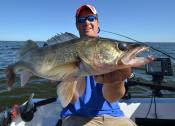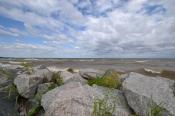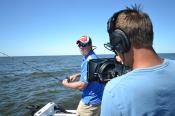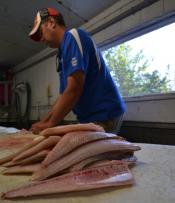 James Holst, Grant Sorenson, and I recently headed north to film a good open-basin crankbait show we’d been hearing about for an upcoming episode of In-Depth Outdoors Television. Experienced trollers of the big water in their own right, Grant and James compared notes, prepped-gear, and brought boxes of cranks to hopefully put in front of some hungry mouths. Luckily for us, “famished” was a better description of the way in which those fish responded to our offerings. At times, we couldn’t keep our baits in the water, and the Skeeter was an absolute mess. Trebles everywhere, including the ones tangled in the net from the last fish, planer boards going out while a fish was coming in, and just an overall wild sense of disarray while we grinned ear-to-ear the whole time.
James Holst, Grant Sorenson, and I recently headed north to film a good open-basin crankbait show we’d been hearing about for an upcoming episode of In-Depth Outdoors Television. Experienced trollers of the big water in their own right, Grant and James compared notes, prepped-gear, and brought boxes of cranks to hopefully put in front of some hungry mouths. Luckily for us, “famished” was a better description of the way in which those fish responded to our offerings. At times, we couldn’t keep our baits in the water, and the Skeeter was an absolute mess. Trebles everywhere, including the ones tangled in the net from the last fish, planer boards going out while a fish was coming in, and just an overall wild sense of disarray while we grinned ear-to-ear the whole time.
 Of course, it took some time to dial things in, and we did our best to pull over fish while continually switching variables until we found magic combinations. The first of which was depth/location. There were quite a few charters and other boats out fishing reefs. They keyed in on deeper breaklines, and we heard reports of people doing fairly well. That said, we were looking for fish in places that couldn’t be more different. Give us flat and relatively unchanging bottom in the 30 foot range, and we were happy campers. This was open-basin trolling at its finest, however, we were keying in on fish right near the bottom. These tended to be the more active and feeding fish wherever we were, and more importantly, they were much more common than the occasional schools of suspended walleyes we were seeing on our electronics. To take advantage of this bite, you also need a big water boat to handle the waves which are just a part of everyday life up on Lake of the Woods. Right now I’m replaying in my mind a number of rogue waves I’m glad we took in our Skeeter WX2100. Even when the wind really kicked up, there wasn’t a single time I was concerned in the least bit.
Of course, it took some time to dial things in, and we did our best to pull over fish while continually switching variables until we found magic combinations. The first of which was depth/location. There were quite a few charters and other boats out fishing reefs. They keyed in on deeper breaklines, and we heard reports of people doing fairly well. That said, we were looking for fish in places that couldn’t be more different. Give us flat and relatively unchanging bottom in the 30 foot range, and we were happy campers. This was open-basin trolling at its finest, however, we were keying in on fish right near the bottom. These tended to be the more active and feeding fish wherever we were, and more importantly, they were much more common than the occasional schools of suspended walleyes we were seeing on our electronics. To take advantage of this bite, you also need a big water boat to handle the waves which are just a part of everyday life up on Lake of the Woods. Right now I’m replaying in my mind a number of rogue waves I’m glad we took in our Skeeter WX2100. Even when the wind really kicked up, there wasn’t a single time I was concerned in the least bit.
 To get baits down to them, we utilized 3 colors of leadcore with a 30 foot leader or so, and backed the line-counter reels with mono. Getting our baits away from the boat with planer boards, was just as important as getting the baits down to the fish. All of our quality fish came on the board rods, though there were times that a specific color or crankbait was so hot that it didn’t matter. Those times were rare, so I’d consider the planer boards an essential part of this technique. Speaking of specific crankbaits, there were times where we simply had a hot bait going. For whatever reason, baits of the same or similar color, trolled at the same depths in the same way, did not produce as well as a single “hot” crankbait. Maybe it was tuned better than the others, maybe it just came with some extra magic straight from the factory. Either way, we weren’t going to argue, and we protected it like it was gold! Fish ran the full range of sizes, and we did particular well on mid-upper 20’s fish when the bite got really going. Those fish that got pulled around on the boards a bit before we noticed them? They made one of the better meals I’ve ever had when Adrian’s Resort cooked them for us upon our return to the docks. Having a bar/restaurant cook the fresh fish you just caught is a premium service in my opinion, and I’ll be doing that again in the future for sure!
To get baits down to them, we utilized 3 colors of leadcore with a 30 foot leader or so, and backed the line-counter reels with mono. Getting our baits away from the boat with planer boards, was just as important as getting the baits down to the fish. All of our quality fish came on the board rods, though there were times that a specific color or crankbait was so hot that it didn’t matter. Those times were rare, so I’d consider the planer boards an essential part of this technique. Speaking of specific crankbaits, there were times where we simply had a hot bait going. For whatever reason, baits of the same or similar color, trolled at the same depths in the same way, did not produce as well as a single “hot” crankbait. Maybe it was tuned better than the others, maybe it just came with some extra magic straight from the factory. Either way, we weren’t going to argue, and we protected it like it was gold! Fish ran the full range of sizes, and we did particular well on mid-upper 20’s fish when the bite got really going. Those fish that got pulled around on the boards a bit before we noticed them? They made one of the better meals I’ve ever had when Adrian’s Resort cooked them for us upon our return to the docks. Having a bar/restaurant cook the fresh fish you just caught is a premium service in my opinion, and I’ll be doing that again in the future for sure!
 Reef Runner deep little rippers were amongst our better baits upon a suggestion from fellow IDO member Corey Cook, especially in colors that did a good job imitating the emerald shiners we found our fish coughing up once we brought them topside. Thanks for all the help Cor! These baits matched the profile and size of one of the more common prey species in the lake, and it was obvious from our results that the fish were ready and willing. Fish were also caught on deep taildancers and thunderstick mad-flash deeps. Another thing that helped put fish in the boat was paying attention to which way you were trolling. Trolling into the waves/wind vs. quartering to/from vs. trolling with the waves/wind all puts your presentation in front of those fish a bit differently, and really made a difference in our catch rate once we found what those fish preferred. This variable, like so many others, is highly dependent upon the day and area you’re fishing. Paying close attention to small details such as this is really the difference maker out there. Never be satisfied with your current presentation until you literally can’t keep up with the fish! It was a great time out there, and I’d like to thank James and Grant for fishing with me. Wishing I was still up there, and looking forward to the next time I can do it again!
Reef Runner deep little rippers were amongst our better baits upon a suggestion from fellow IDO member Corey Cook, especially in colors that did a good job imitating the emerald shiners we found our fish coughing up once we brought them topside. Thanks for all the help Cor! These baits matched the profile and size of one of the more common prey species in the lake, and it was obvious from our results that the fish were ready and willing. Fish were also caught on deep taildancers and thunderstick mad-flash deeps. Another thing that helped put fish in the boat was paying attention to which way you were trolling. Trolling into the waves/wind vs. quartering to/from vs. trolling with the waves/wind all puts your presentation in front of those fish a bit differently, and really made a difference in our catch rate once we found what those fish preferred. This variable, like so many others, is highly dependent upon the day and area you’re fishing. Paying close attention to small details such as this is really the difference maker out there. Never be satisfied with your current presentation until you literally can’t keep up with the fish! It was a great time out there, and I’d like to thank James and Grant for fishing with me. Wishing I was still up there, and looking forward to the next time I can do it again!